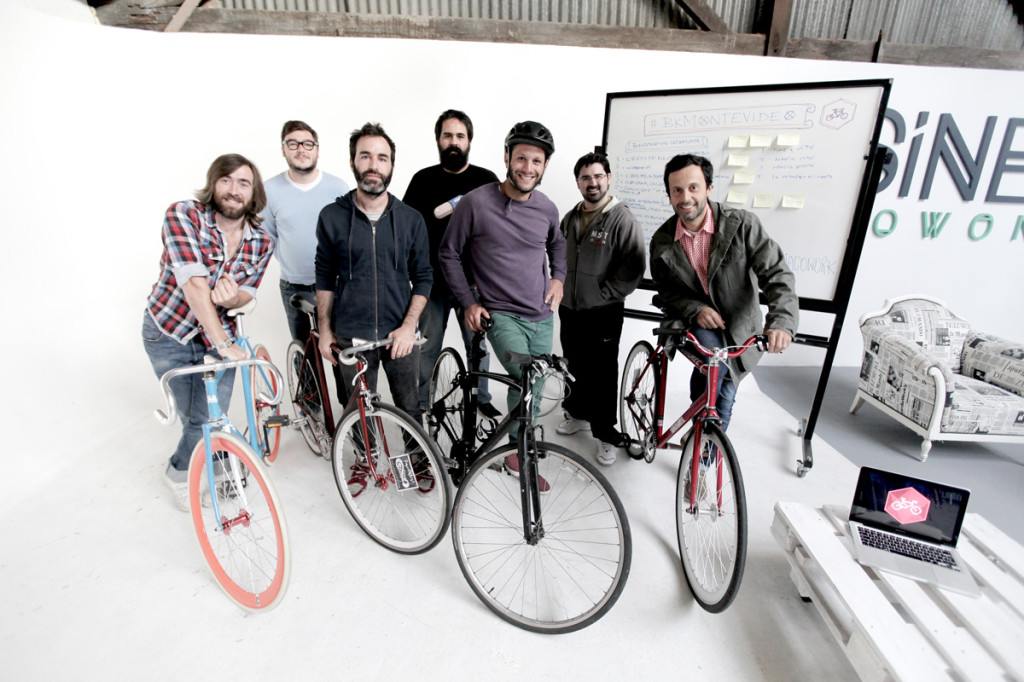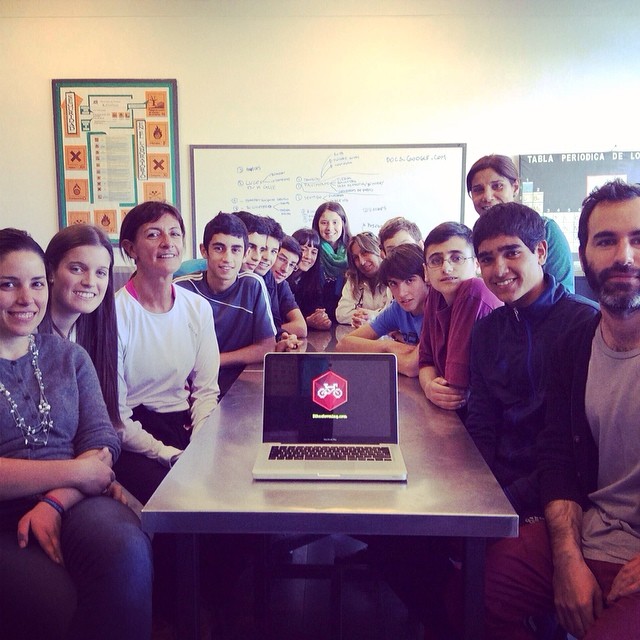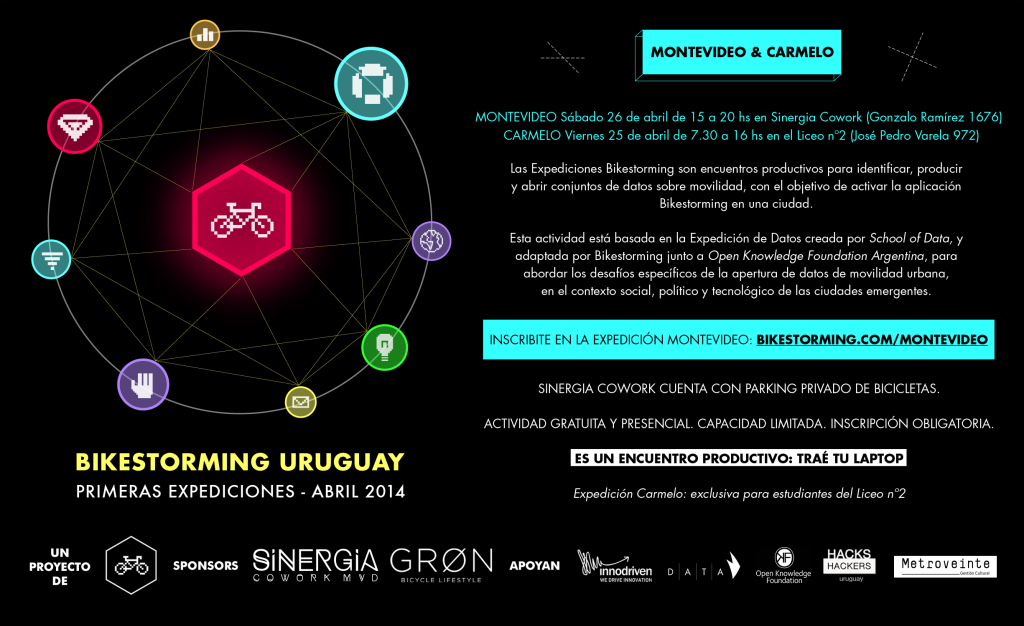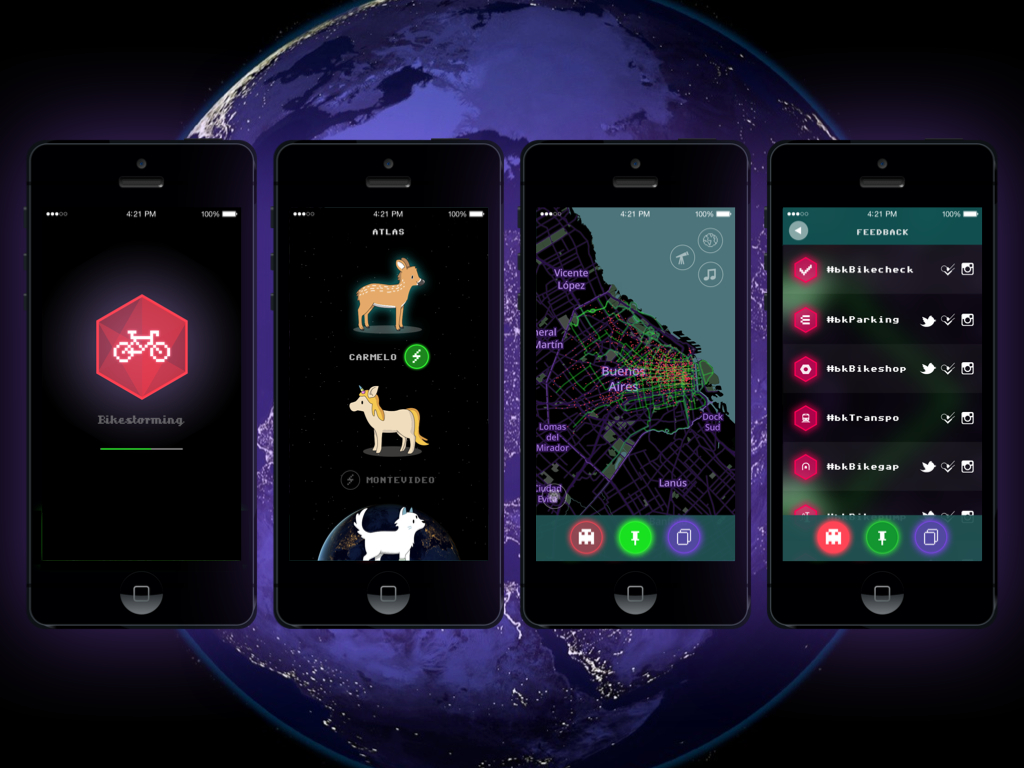Interview: Bikestorming
We are joined by Matías Kalwill of Bikestorming to share how he has used his love of cycling and special events including data expeditions to build a product and community. He recently presented this PechaKucha talk all about his project.
(Traducción en español abajo)
Bikestorming is a great project. Can you tell us about the project and its evolution?
Bikestorming is a soon-to-be-released mobile app to grow urban cycling everywhere. It helps people navigate the city on a bicycle by providing them with amazingly useful information in a Map. And it invites them to contribute to this information through Missions.
This information is actually open data available and produced by the community. We either use data from open sources like local open data portals and OpenStreetMap, or open the datasets gathered in the local activation of the app, and push it back to the open knowledge ecosystem.
To achieve this “always-open” workflow with the data is not an easy task, since the data we bring into a local map is usually scattered around websites, loosely-tagged entries on OpenStreetMap, or PDFs and Word documents (ouch!!!) in local government offices. That’s why part of our effort is to solving this problems in the back-end: bring multiple and diverse data sources together, and push them into the app, and into the open, in an elegant and useful manner.
After a couple of years of experimenting with a wide range of technologies, both the mobile and server app are coming together in a surprisingly useful and beautiful way. We look forward to sharing this with the Open Knowledge community and seeing what crazy hacks might happen from that :)
How have you connected via communities (eg. Hacks/Hackers and Escuela de Datos) to build your project?
Though the project was born out of the urban cycling and music/art scene of Buenos Aires, after some time working on the vision / mission / values statement it became clear that this was going to be a tech project. I’m a Visual Arts and Industrial Design graduate, so whatever I learned about apps, code and data I learned by hacking and making with the amazing civic tech community of Buenos Aires and beyond. The first lines of code where actually written on Hacks/Hackers Buenos Aires’ Media Party in 2012, and all developers on board now I have met at civic hackatons and tech meetups. I have personally punched a ton of pencils, pixels, wireframes and time into the app, but it would have never happened without the community getting behind it across two years of hacking on every idea i’d pitch, at pretty much every civic tech meet up of 2012 and 2013 in Buenos Aires. It’s been super fun.
What are the next steps for Bikestorming?
Right now we are piloting the app roll-out in a small and medium city. This means both packaging and distributing the app here, as well as working with the local community and government to figure out what and how this makes sense and can grow for each specific place, at this time.
The way we work with the local communities is through productive meet-ups called Bikestorming Expeditions, which started as a fork of the School of Data’s Data Expeditions, and are designed to to identify, gather and open datasets to activate the app in a any given city, at any given time.
All of this is happening right now in Uruguay. There might be something big in August, of which I shouldn’t say too much because it’s still cooking. But follow us on Twitter to stay tuned for some exciting news, about a massive open data collaboration happening in a small and beautiful country on this side of the planet :)
After this we would like to do a roll out the app in a big city on either North America or Europe. Working slowly through the winter to have the app running for springtime gives us the time and momentum we need, to learn from the community and iterate on the technology, so we can make an amazing product.
Sometime on 2015 we should be ready to roll out everywhere. We believe that the world is full of bikestormers, waiting to connect as a community and get their hands on this exciting project, both as users and makers.
Any tips you can share with people who want to do something similar?
Well, although we’ve gotten a lot of attention from the media and received a bunch of awards, I’m not sure I’m entitled to giving advice, since our product is not out there yet. I mean, it could totally fail and have no one use it. Then I’m sure I would have a lot of advice to give hehe.
But I can share an important insights about civic tech I’ve learned a long the way:
Don’t settle for an awesome vision with a lame product.
Let me explain: your vision should guide your product as it evolves, but never replace it. If you are building a piece of civic technology to improve other people’s lifes, work hard to listen and understand what your audience needs. Don’t just package your values into an app. Your product should solve very specific problems for a very specific audience. Make it fun. Make it sexy.
Make it affordable and easy to understand. Because if you succeed in solving this specific problem for a very specific audience, in an engaging way, your product might go beyond its initial borders of super-concerned individuals and early adopters. It might become a great tool for this new kind of active citizenship that is emerging everywhere, thanks to faster networks and low-cost mobile devices.
It is important to build good, vision-driven apps. To make them well, and have them go mainstream.
It cannot be that people only drool for profit-driven products.
We need civic tech that is hot and awesome.
Bikestorming: Datos, ciclismo y apps
Este blog post fue escrito originalmente en inglés para School of Data por Matías Kalwill, director del inspirador proyecto (orgullosamente latino) que nos comparte hoy.
Bikestorming es una aplicación móvil de próximo lanzamiento, para aumentar el ciclismo urbano en las ciudades. Ayuda a las personas a navegar la ciudad en bicicleta al proveerles de información altamente útil en un mapa, y les invita a contribuir a agregar información a través de misiones.
Esta información de hecho se trata de datos abiertos disponibles y producidos por la comunidad. Usamos datos de fuentes abiertas como portales y <a href=”OpenStreetMap, o abrimos los datasets compilados en activaciones locales de la aplicación para incorporarlos al ecosistema de conocimiento abierto.
Conseguir este flujo de información “siempre abierta” no es tarea sencilla, pues los datos que llevamos a un mapa local generalmente están distribuidos en distintos sitios, entradas con etiquetas diversas en OpenStreetMap, o PDFs o documentos de Word (¡OUCH!) de gobiernos locales. Por eso, parte de nuestro esfuerzo es resolver estos problemas tras bambalinas: juntar fuentes múltiples de datos y llevarlas al app y al ecosistema abierto de manera elegante y útil.
Después de un par de años de experimentación con un amplio rango de tecnologías, las aplicaciones móvil y de servidor por fin están en crecimiento. Esperamos ansiosamente el día de compartir esto con la comunidad de Open Knowledge y ver qué hacks locos pueden surgir de ello. :)
¿Cómo se han conectado a comunidades (como Hacks/Hackers y Escuela de Datos) para impulsar el proyecto?
Aunque el proyecto nació en las escenas de ciclismo urbano y música/arte de Buenos Aires, se volvió claro cuando trabajamos en la visión/misión/valores de Bikestorming que esto iba a ser un proyecto tecnológico. Soy graduado de Artes visuales y Diseño industrial, así que todo lo que he aprendido sobre apps, código y datos ha sido gracias a la increíble comunidad de tecnología para usos cívicos en Buenos Aires y alrededores. Escribimos las primeras líneas de código de Bikestorming en la Media Party de Hacks/Hackers en 2012, y conocí a todos los desarrolladores involucrados en el proyecto en hackatones y meetups de tecnología para fines cívicos. Personalmente, he inyectado muchos lápices, pixeles, diseño y tiempo al app, pero nunca hubiera avanzado como lo hice sin la comunidad que la ha respaldado durante dos años de hackeo de todas las ideas que he presentado en casi todos los eventos a los que he asistido desde 2012 en Buenos Aires. Ha sido muy divertido.
¿Cuáles son los siguientes pasos para Bikestorming?
Ahora estamos piloteando el lanzamiento de Bikestorming en una ciudad pequeña y mediana. Esto significa “empaquetar” y distribuir el app ahí, así como trabajar con la comunidad y los gobiernos locales para ver cómo esto hace sentido y puede crecer para cada lugar específico.
La manera en que trabajamos con comunidades locales es a través de meetups productivos llamados Expediciones Bikestorming, que empezaron como una adaptación de las expediciones de datos de Escuela de Datos, y están diseñadas para identificar, recolectar y abrir datasets para activar el app en una ciudad en un momento determinado.
Todo esto está sucediendo ahora en Uruguay. Podría haber algo grande en agosto, de lo cual no debería contar demasiado pues aún se está cocinando. Pero síguenos en Twitter para estar al tanto de las noticias que compartiremos acerca de una gran colaboración de datos abiertos sucediendo en un pequeño y bello país en este lado del planeta :)
Después de esto, nos gustaría lanzar el app en alguna ciudad grande de Norteamérica o Europa. Trabajar durante el invierno para tener el app lista para la primavera nos da el tiempo y fuerza necesarios para aprender de la comunidad y alimentar así la tecnología para tener un producto sensacional.
En algún punto de 2015 deberíamos estar listos para hacer el lanzamiento en todos lados. Creemos que el mundo está lleno de bikestormers esperando a conectarse como comunidad y sumarse al proyecto, como usuarios y como co-creadores.
¿Algún tip que puedas compartir con personas que quieren hacer algo similar?
Bueno – aunque hemos recibido mucha atención de los medios y algunos premios, no me siento con la autoridad de dar consejos, pues nuestro producto aún no sale. Es decir, podría fallar totalmente – lanzarse y que nadie la usara. En ese caso, tendría muchos consejos que dar, jeje.
Pero puedo compartir una reflexión sobre tecnología para fines cívicos que he aprendido a lo largo del camino:
No te conformes con una visión excelente ejecutada en un mal producto.
Me explico: tu visión debe guiar tu producto en su evolución, pero nunca reemplazarlo. Si estás construyendo una tecnología con fines cívicos para mejorar las vidas de otras personas, trabaja duro para escuchar y entender lo que necesita tu audiencia. No sólo pongas tus valores en un app. Tu producto debe resolver problemas muy específicos para una audiencia muy específica. Hazlo divertido. Hazlo sexy.
Hazlo asequible y fácil de entender, pues si tienes éxito en la resolución de ese problema específico de esa audiencia específica en una manera que la involucre, tu producto podría ir más allá de las fronteras iniciales de individuos súper interesados y usuarios tempranos. Podría convertirse en una gran herramienta para este nuevo tipo de ciudadanía activa que está emergiendo en todos lados, gracias a redes más rápidas y móviles de bajo costo.
Es importante construir buenas apps guiadas por un buenas visiones; hacerlas bien y lograr que se vuelvan masivas. No puede ser que la gente sólo babee por productos hechos por lucro.
Necesitamos tecnología para fines cívicos que sea sexy e increíble.
Puedes estar al tanto de las noticias de Bikestorming en Twitter, y puedes también ver sus materiales en PechaKucha.





